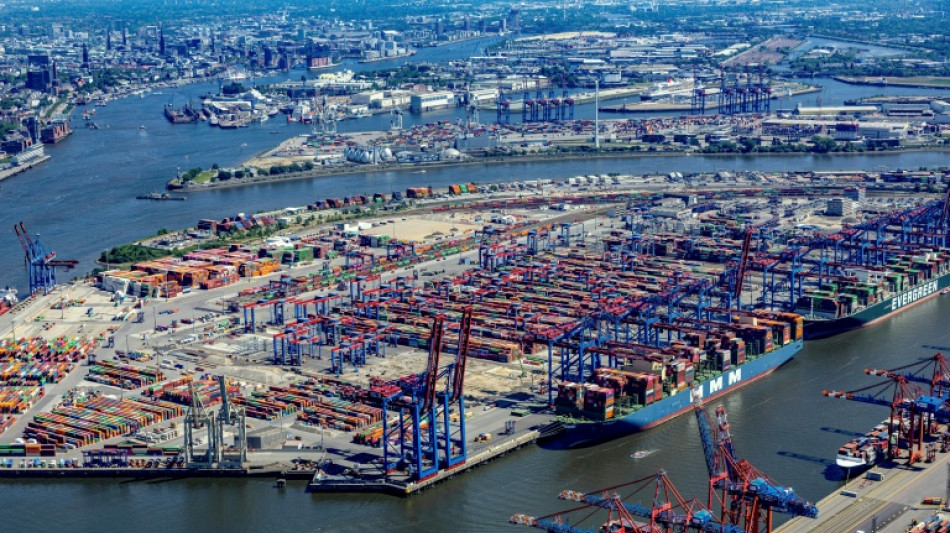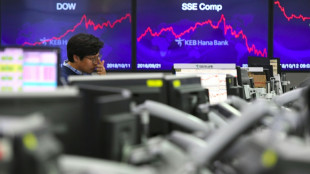
-
 BMW boosts profitability, welcomes Nexperia signals
BMW boosts profitability, welcomes Nexperia signals
-
EU strikes last-ditch deal on climate targets as COP30 looms

-
 Stocks retreat as tech bubble fears grow
Stocks retreat as tech bubble fears grow
-
Shein opens first permanent store amid heavy police presence

-
 West Indies edge New Zealand despite Santner brilliance
West Indies edge New Zealand despite Santner brilliance
-
French pair released by Iran await return home

-
 German factory orders up but outlook still muted
German factory orders up but outlook still muted
-
Death toll tops 100 as Philippines digs out after typhoon

-
 Attack on key city in Sudan's Kordofan region kills 40: UN
Attack on key city in Sudan's Kordofan region kills 40: UN
-
'No one could stop it': Sudanese describe mass rapes while fleeing El-Fasher

-
 Champagne and cheers across New York as Mamdani soars to victory
Champagne and cheers across New York as Mamdani soars to victory
-
Medieval tower collapse adds to Italy's workplace toll

-
 BMW boosts profitability despite China, tariff woes
BMW boosts profitability despite China, tariff woes
-
South Africa's Wiese wary of 'hurt' France before re-match

-
 Asian markets sink as tech bubble fears grow
Asian markets sink as tech bubble fears grow
-
Beyond limits: Croatian freediver's breathtaking record

-
 Tottenham supporting Udogie after alleged gun threat in London
Tottenham supporting Udogie after alleged gun threat in London
-
Thunder roll Clippers to stay unbeaten as SGA keeps streak alive

-
 In appeal, Australian mushroom murderer alleges 'miscarriage of justice'
In appeal, Australian mushroom murderer alleges 'miscarriage of justice'
-
Toyota hikes profit forecasts 'despite US tariffs'

-
 Typhoon death toll soars past 90 in the Philippines
Typhoon death toll soars past 90 in the Philippines
-
Ex-France lock Willemse challenges Meafou to become 'the bully'

-
 Ukrainians to honour sporting dead by building country they 'died for': minister
Ukrainians to honour sporting dead by building country they 'died for': minister
-
At least 7 dead after UPS cargo plane crashes near Louisville airport

-
 US Supreme Court hears challenge to Trump tariff powers
US Supreme Court hears challenge to Trump tariff powers
-
US government shutdown becomes longest in history

-
 India's Modi readies bellwether poll in poorest state
India's Modi readies bellwether poll in poorest state
-
Green goals versus growth needs: India's climate scorecard

-
 Where things stand on China-US trade after Trump and Xi talk
Where things stand on China-US trade after Trump and Xi talk
-
Sri Lanka targets big fish in anti-corruption push

-
 NY elects leftist mayor on big election night for Democrats
NY elects leftist mayor on big election night for Democrats
-
Injured Jordie Barrett to miss rest of All Blacks tour

-
 Asian markets tumble as tech bubble fears grow
Asian markets tumble as tech bubble fears grow
-
Pay to protect: Brazil pitches new forest fund at COP30

-
 Australia pick 'impressive' Weatherald in first Ashes Test squad
Australia pick 'impressive' Weatherald in first Ashes Test squad
-
Iraq's social media mercenaries dying for Russia

-
 Young leftist Trump foe elected New York mayor
Young leftist Trump foe elected New York mayor
-
Concerns at ILO over expected appointment of close Trump advisor

-
 Venus Williams to return to Auckland Classic at the age of 45
Venus Williams to return to Auckland Classic at the age of 45
-
No deal yet on EU climate targets as COP30 looms

-
 Typhoon death toll climbs to 66 in the Philippines
Typhoon death toll climbs to 66 in the Philippines
-
NATO tests war preparedness on eastern flank facing Russia

-
 Uncapped opener Weatherald in Australia squad for first Ashes Test
Uncapped opener Weatherald in Australia squad for first Ashes Test
-
Liverpool down Real Madrid in Champions League, Bayern edge PSG

-
 Van Dijk tells Liverpool to keep calm and follow Arsenal's lead
Van Dijk tells Liverpool to keep calm and follow Arsenal's lead
-
PSG left to sweat on injuries to Dembele and Hakimi

-
 Reddit, Kick to be included in Australia's social media ban
Reddit, Kick to be included in Australia's social media ban
-
Ex-Zimbabwe cricket captain Williams treated for 'drug addiction'

-
 Padres ace Darvish to miss 2026 MLB season after surgery
Padres ace Darvish to miss 2026 MLB season after surgery
-
Diaz hero and villain as Bayern beat PSG in Champions League showdown


Pressure on Merz as Trump tariffs hit German economy
Germany's economy shrank more than expected in the second quarter as US tariffs battered exports, official data showed Friday, ramping up pressure on Chancellor Friedrich Merz to turn Europe's top economy around.
Gross domestic product (GDP) fell 0.3 percent from the previous quarter, federal statistics agency Destatis said, as it revised down an earlier July estimate of a drop of just 0.1 percent.
Goods exports fell 0.6 percent and spending on machinery and equipment fell 1.9 percent, underlying the difficulties faced by the country's manufacturers in the first full quarter after increased US tariffs took effect.
The United States is a Germany's largest trade partner, taking about 10 percent of its exports, and a key destination for products from cars to chemicals.
Household consumption came out lower than initial data had suggested while the manufacturing and construction sectors had also performed worse than expected.
Shock data released earlier in August showed that German industrial production had in June plunged to its lowest level since the pandemic in 2020.
- Trade tensions -
Fixing the eurozone's traditional export powerhouse has been a key priority for Merz, with the economy battered in recent years by high energy costs and fierce Chinese competition.
In July, Destatis said that German GDP fell 0.9 percent in 2023 and 0.5 percent in 2024, reporting that the contraction in those years was even worse than previously reported.
Plans to spend hundreds of billions of euros on infrastructure upgrades and rearmament -- combined with a series of brighter data releases since the start of the year -- had raised hopes that the worst might be over.
German business morale rose to its highest level in July after seven straight increases, while think tanks including the respected DIW institute have revised growth forecasts up for 2025 and 2026.
But ING bank analyst Carsten Brzeski said today's data suggested that increased optimism was a result not of a sustained upswing but rather temporary front-loading as US customers rushed to get orders in before new tariffs took effect.
"Optimism alone doesn't bring back growth," he said. "A full reversal of previous US front-loading effects has pushed the German economy back into recessionary territory."
Though the United States and European Union clinched a deal at the end of July to avert a full-blown trade war, ongoing uncertainty around its implementation is hitting German exporters.
The two sides released details of the deal on Thursday, with most EU goods facing a 15-percent tariff.
Cars, however, are still getting a 27.5 percent rate, with the tariff dropping to 15 percent only once the EU introduces legislation to eliminate its own levies on US industrial products.
"It is hard to see how the export-dependent German economy will be able to get out of seemingly never-ending stagnation," Brzeski said.
- Budget troubles -
Social Democrat finance minister Lars Klingbeil has meanwhile floated the possibility of tax rises to plug a 30 billion euro ($34.8 billion) hole in 2027 spending plans, sparking swift rebukes from his conservative coalition partners.
Talk of tax rises threatened to act as an extra brake on growth, Brzeski said, blunting the impact of the bumper infrastructure- and defence-spending plans.
"The longer a debate on potential austerity measures lasts, the higher the risk that households and companies will hold back spending and investment decisions," he said.
"The German economy has made itself too comfortable in stagnation, and it could take until next year before a more substantial recovery starts to unfold."
Q.Najjar--SF-PST
